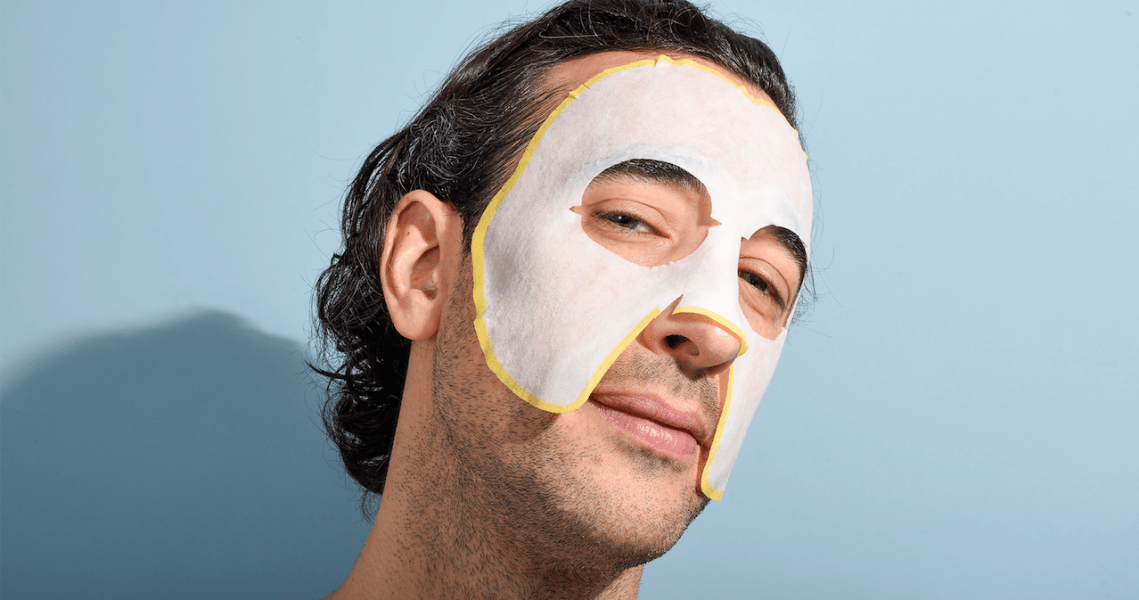The men’s grooming market is about to become more sophisticated.
Over the last 18 months, a bevy of male-oriented brands launched with the intention to elevate their basic skin-care routines beyond face wash and moisturizers. Hetime, launched in January, offers sheet masks designed with the male face in mind. Men’s brand Lumin offers moisturizers, exfoliators and face oil, and added five more products to its portfolio in March, including face masks, eye masks and pore strips. Before this was the launch of Soft, another face-mask brand, in November. K-beauty brand Jaxon Lane launched “Bro Masks” in 2018, and subscription grooming brand Geologie launched that same year.
“Guys are absolutely ready for elevating their grooming. It’s not something they know they want or a lot of guys may think they need it, but [even if they’re convinced] they don’t know where to look,” said Darwish Gani, Lumin co-founder.
Gani declined to specify how many subscribers Lumin has but said the number is in the six-figure range. After three months, more than 50% of customers repurchase from the brand. Men can purchase à la carte products on Lumin’s e-commerce website and Amazon, and can also opt into a subscription where they can save 20% off the retail price of products. Eighty percent of Lumin sales are subscription, said Gani. So far, the core customer group is men between 18 and 25 years old.
Lumin tries to take men’s initial lack of familiarity with skin care into account when it communicates with shoppers. The brand is testing out the right cadence for emails — it typically sends a product order confirmation email followed by a 15-day check-in email, and then one email every month afterward. Lumin will probe customers for information about their skin-care history, and as the customer continues to place orders, the brand will start to send more advanced literature, such as ingredient-specific information, said Gani. Lumin also communicates that products should be used in conjunction with one another for compounding benefits, which further reaffirms its full routine mantra.
Geologie also sets out to establish a routine for men, through a quiz that collects up to 20 data points about their experience with skin care and their skin conditions. Consumers are matched with one of 36 skin-type profiles and given the option to buy a box of four recommended products. In the third quarter, the brand will add an acne face wash and a day cream to its offerings and will increase its skin-type profiles to 50. So far, Geologie has over 5,000 subscribers. More than 50% of those who receive their first box continue with a subscription, and overall subscription retention is greater than 50%, said Nick Allen, Geologie co-founder.
According to Allen, nearly 70% of Geologie customers have never had a routine before, so the brand finds it helpful to have a high-touch relationship with customers via email. Customers receive up to six emails in the first 30 days after their first purchase, including confirmation and shipping emails. The other emails include tips and tricks for what to expect from Geologie’s products, what products to use, and when and how to build a total skin-care routine.
The idea is to offer men multiple products but reduce the paradox of choice by only offering the full lineup to first-time customers. Subsequent orders still feature multiple products, but a customer can choose from six different options.
“We feel strongly about getting guys into complete skin-care regimens,” said Dave Skaff, Geologie co-founder. “A big part of that is not just getting them into washing their face and using a daily moisturizer, which is probably what most men think skin care is.”
Social media has perhaps played the most prominent role in advancing men’s grooming habits, but the concept still has not reached the mainstream. Hetime is entering into two Neighborhood Goods stores in Austin and New York the week of March 9, but the idea of sophisticated men’s products is yet to be found in mass retailers. Oscar Yaun, an analyst at Ipsos market research firm, said that Instagram, in particular, is a place to test concepts before trying to go broader.
“[The brands on Instagram] are a bit more progressive than what might be right for mainstream … [but] there would be no shift in the category if not for brands like these,” said Yuan.
Instagram is the present playing field for Hetime, where the brand is using over 100 unpaid influencers to gain awareness. The sheet masks are designed with men in mind, said Christopher Carl and Samantha Bergmann, Hetime co-founders. The masks are slightly larger to fit men’s faces and allow more movement around the mouth and jaw, and accommodate for facial hair. In addition, the packaging specifies not only ingredient information but also calls out that it is designed for men and offers more detailed usage instructions compared to traditional sheet masks. However, the brand’s approach to both its packaging and online communications is to be inclusive and to invite men to place greater emphasis on their skin and self-care.
“Nowadays, brands can have a great product, but if they don’t have a story or a mission that they really believe in, it’s going be hard to find footing in the market,” said Bergmann.




